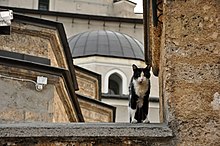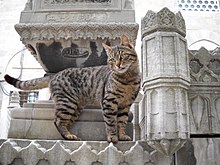Islam and cats

The domestic cat is a revered animal in Islam. Admired for their cleanliness, cats are considered "the quintessential pet" by Muslims.[1]
Origins of reverence[]

Cats have been venerated in the Near East since antiquity, a tradition adopted by Islam, albeit in a much modified form.[2] According to many hadith, Muhammad prohibited the persecution and killing of cats.[1]
One of Muhammad's companions was known as Abu Hurairah (literally: "Father of the Kitten") for his attachment to cats.[3] Abu Hurairah claimed that he had heard Muhammad declare that a pious woman went to Hell for after she had been annoyed by a female cat, tied her with a rope and neglected to provide her with food and water until she died.[4] According to legend, Abu Saeed's cat saved Muhammad from a snake.[1]
History[]

The American poet and travel author Bayard Taylor (1825–1878) was astonished when he discovered a Syrian hospital where cats roamed freely. The institution, in which domestic felines were sheltered and nourished, was funded by a waqf, along with caretakers' wages, veterinary care and cat food. Edward William Lane (1801–1876), a British Orientalist who resided in Cairo, described a cat garden originally endowed by the 13th-century Egyptian sultan Baibars, whose European contemporaries held a very different attitude towards cats, eating them or killing them under papal decrees.[1] Wilfred Thesiger, in his book The Marsh Arabs, notes that cats were allowed free entry to community buildings in villages in the Mesopotamian Marshes, and even fed.[5][page needed] Aside from protecting granaries and food stores from pests, cats were valued by the paper-based Arab-Islamic cultures for preying on mice that destroyed books. For that reason, cats are often depicted in paintings alongside Islamic scholars and bibliophiles. The medieval Egyptian zoologist Al-Damiri (1344–1405) wrote that the first cat was created when God caused a lion to sneeze, after animals on Noah's Ark complained of mice.[1]
Hygiene and neutering[]
In Islamic tradition, cats are admired for their cleanliness. They are thought to be ritually clean, and are thus allowed to enter homes[1] and even mosques, including Masjid al-Haram. Food sampled by cats is considered halal, in the sense that their consumption of the food does not make it impermissible for Muslims to eat, and water from which cats have drunk is permitted for wudu (the ablution that is done by Muslims).[1] Furthermore, there is a belief among some Muslims that cats seek out people who are praying.[6]
Muslim scholars are divided on the issue of neutering animals. Most, however, maintain that neutering cats is allowed "if there is some benefit in neutering the cat and if that will not cause its death".[7] Muhammad ibn al Uthaymeen, a 20th-century Saudi Arabian Sunni imam, preached:
If there are too many cats and they are a nuisance, and if the operation will not harm them, then there is nothing wrong with it, because this is better than killing them after they have been created. But if the cats are ordinary cats and are not causing a nuisance, perhaps it is better to leave them alone to reproduce.[7]
Muezza[]
Many Muslims believe that Muezza (or Muʿizza; Arabic: معزة) was Muhammad's favorite cat.[8][9] Muhammad awoke one day to the sounds of the adhan. Preparing to attend prayer, he began to dress himself; however, he soon discovered his cat Muezza sleeping on the sleeve of his prayer robe. Rather than wake her, he used a pair of scissors to cut the sleeve off, leaving the cat undisturbed. Another story is, upon returning from the mosque, Muhammad received a bow from Muezza. He then smiled and gently stroked his beloved cat three times.[8][9] There is no mention of any such cat or the associated story in the hadith or supplementary works[10] and there are similar stories attributed to someone else from 6th century Arabia which may explain the origin of the story.[11] However, there seems to be a lack of evidence for the existence of this cat (Muezza), from the Muslim sources of hadith.
See also[]
- Cats in ancient Egypt
- Cultural depictions of cats
- Feral cats in Istanbul
- Human interaction with cats
- Islam and dogs
- Moral status of animals in the ancient world
References[]
- ^ a b c d e f g Campo, Juan Eduardo (2009). Encyclopedia of Islam. Infobase Publishing. p. 131. ISBN 978-0-8160-5454-1.
- ^ Baldick, J. (2012). "Into the modern world". Mystical Islam: An Introduction to Sufism. London, New York: I.B. Tauris & Co. Ltd. pp. 132−168. ISBN 9781860646317.
- ^ Glassé, Cyril (2003). The New Encyclopedia of Islam. Rowman Altamira. p. 102. ISBN 0759101906.
The attachment to cats of one of the Companions, Abū Hurayrah ('Father of the Kitten'), is proverbial.
- ^ Kurzman, Charles, ed. (1998). Liberal Islam: A Source Book. Oxford University Press. p. 121. ISBN 0-19-511622-4.
- ^ Thesiger, Wilfred (1964). The Marsh Arabs. London: Longmans.
- ^ Glassé, Cyril (2003). The New Encyclopedia of Islam. Rowman Altamira. p. 102. ISBN 0759101906.
Stories of cats who seek out persons who are praying, and of cats sensitive to the presence of grace, are common.
- ^ a b Abdul-Rahman, Muhammad Saed (2004). "Chapter 13: Transactions Animal Rights". Islam: Questions and Answers—Jurisprudence and Islamic Rulings: General and Transactions, Part 1. Vol. 22. Herne Hill, London, UK: MSA Publication Limited. pp. 323–325. ISBN 1-86179-411-8.
- ^ a b Geyer, Georgie Anne (2004). When Cats Reigned Like Kings: On the Trail of the Sacred Cats. Kansas City, Missouri: Andrews McMeel Publishing. p. 28. ISBN 0-7407-4697-9.
In still another charming legend about the Prophet, one day his favorite cat Muezza bowed to thank him for some kind favor and, by this story, Muhammad then passed his hand down three times the length of the animal's back, giving to it—and to all cats evermore—the enviable capacity always to land squarely on their feet.
- ^ a b Stall, Sam (2007). 100 Cats Who Changed Civilization: History's Most Influential Felines. Quirk Books. p. 40. ISBN 978-1-59474-163-0.
- ^ Motala, Moulana Suhail (2020-11-25). "Did Nabi (sallallahu 'alayhi wa sallam) have a cat named Muezza?". Hadith Answers. Retrieved 2021-03-15.
- ^ "The Prophet's cat Muezza". Islamic Portal. 2020-10-09. Retrieved 2021-03-15.
External links[]
- Cats as pets
- Animals in Islam
